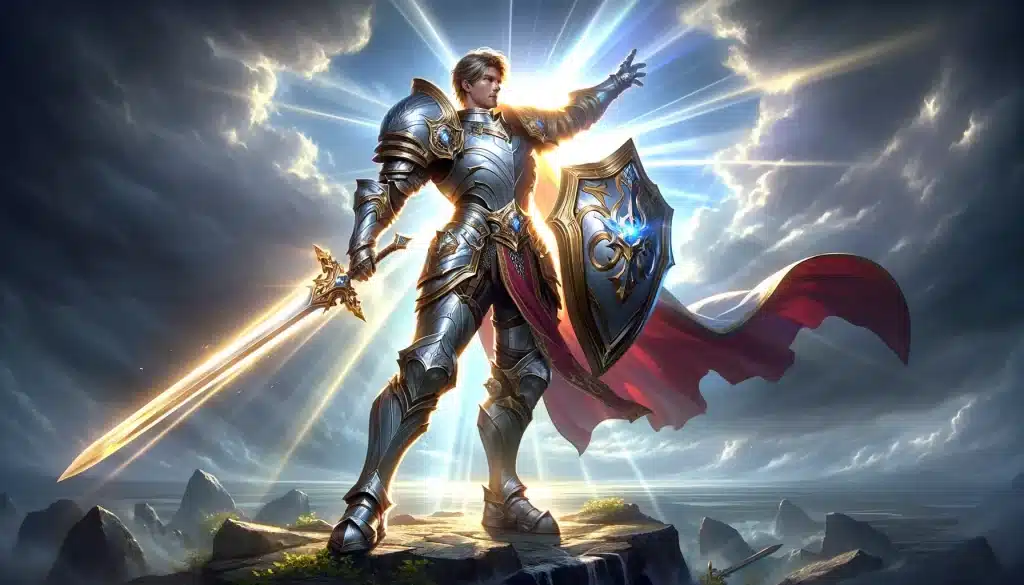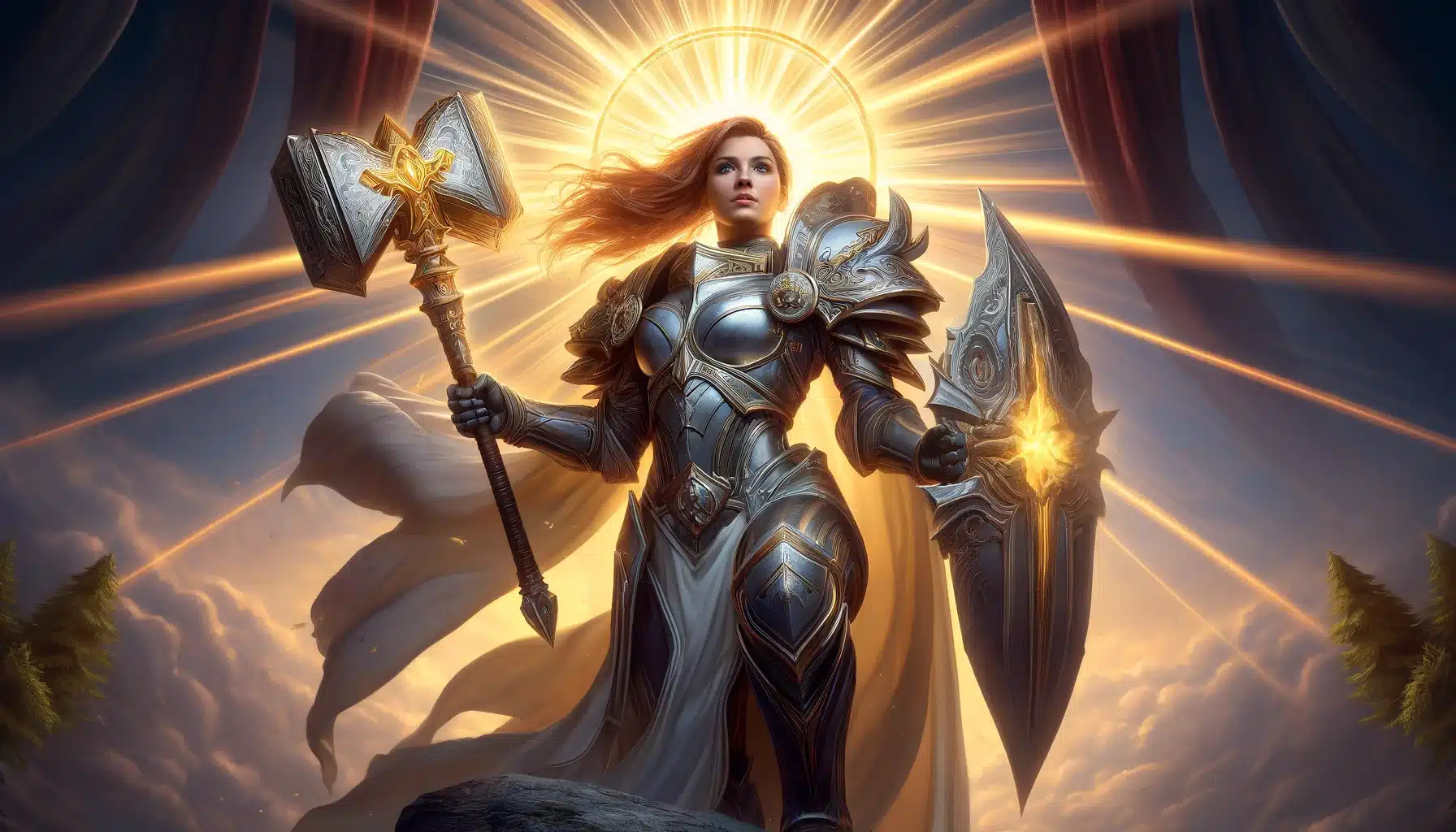Ready to Take a 5e Paladin Oath? Read Our Expert D&D Guide to the Most Righteous of Wizards of the Coast’s Dungeons and Dragons Classes
Paladins, the stalwart defenders of justice and righteousness, are one of the most iconic classes in Dungeons & Dragons (D&D) 5th Edition. Combining martial prowess with divine magic, paladins are holy warriors bound by sacred oaths that grant them powerful abilities and spells. If you’re looking to play a character who can smite evil, heal the wounded, and inspire allies, then the paladin is the class for you. In this comprehensive guide, we’ll cover everything you need to know to create and play a paladin in D&D 5e.
Paladin Character Creation
Creating a paladin in D&D 5e is a journey that starts with a vision of a character who is not only a mighty warrior but also a beacon of hope and righteousness. The choices you make during character creation will shape your paladin’s story, abilities, and how they interact with the world. From selecting a race that complements your divine mission to distributing ability scores that will define your combat prowess and spellcasting capabilities, every decision is an opportunity to bring your ideal paladin to life.
The character creation process is a mix of mechanical optimization and rich storytelling. Think about your paladin’s backstory and what led them to take their sacred oath. Are they a former soldier who found faith on the battlefield, or a noble knight dedicated to protecting the innocent? Perhaps they were chosen by a deity to carry out a divine mission. Your paladin’s background will inform their motivations and how they uphold their oath.
Race Selection
Choosing the right race for your paladin is crucial, as it can provide additional benefits that enhance your character’s abilities. Here are some top picks:
Half-Elf: With a +2 Charisma and +1 to two other ability scores of your choice, half-elves make versatile and powerful paladins. Their Fey Ancestry also provides resistance to charm and immunity to magical sleep. This blend of abilities makes half-elves adaptable, whether you need to bolster your combat skills or improve your spellcasting.
Human: The variant human is a popular choice for paladins due to the extra feat at 1st level, which can be used to bolster combat prowess or enhance spellcasting abilities. This flexibility allows for a customized build that can fit any concept you have for your paladin, whether you’re focusing on martial mastery or divine power.
Dwarf: Hill dwarves and mountain dwarves both offer bonuses to Constitution, enhancing a paladin’s durability. Dwarven resilience against poison can also be invaluable. Hill dwarves provide extra hit points, while mountain dwarves offer a boost to Strength, making them a solid choice for a frontline warrior who can take and dish out significant damage.
Try my AI Tabletop RPG generators...and an extensive library of content!
Dragonborn: With a +2 Strength and +1 Charisma, dragonborn make excellent paladins. Their breath weapon adds a unique combat option, and their Draconic Ancestry can provide resistance to specific damage types. This combination of raw power and magical heritage can make for a paladin with an imposing presence on the battlefield and a deep connection to their draconic roots.
Ability Scores
Paladins rely on several key ability scores to be effective in both combat and spellcasting. When allocating your ability scores, consider the following priorities:
Strength: This is your primary stat for weapon attacks and is critical for melee combat effectiveness. A high Strength score ensures you can deal significant damage and handle physical challenges with ease.
⚔️ Fantasy RPG Random Tables Books
Make life as a Gamemaster easier…
If you play Dungeons & Dragons, Pathfinder, or other fantasy RPGs, this
RPG random tables series
is packed with encounters, NPCs, treasure, and more. Available in eBook or print—either way, you’ll have a wealth of adventure ideas at your fingertips.
Charisma: Essential for spellcasting and many class features, including Divine Smite and Aura abilities. A high Charisma score enhances your spellcasting potency and the effectiveness of your abilities that influence and protect your allies.
Constitution: Important for hit points and concentration checks. A robust Constitution score increases your survivability and helps maintain concentration on important spells during combat.
Wisdom: Useful for perception checks and saving throws, but not as critical as Strength and Charisma. While it’s good to have a reasonable Wisdom score to spot hidden dangers and resist certain effects, it’s typically a secondary priority.
A typical ability score distribution might prioritize Strength and Charisma, with a good Constitution score to ensure durability in combat. This balance allows your paladin to excel in both dealing and taking damage while also supporting your party with spells and class features.

Class Features and Abilities
Paladins come equipped with a range of powerful abilities that define their role as divine warriors. Here are some key features:
Divine Sense and Lay on Hands: At 1st level, paladins gain access to these iconic abilities. Divine Sense allows paladins to detect celestial, fiendish, and undead presences, providing crucial information about hidden threats. Lay on Hands offers a healing pool that can be used to restore hit points to yourself or others, scaling with your level for reliable and flexible healing.
Fighting Style: At 2nd level, paladins choose a Fighting Style, enhancing their combat capabilities. Popular choices include Defense, which grants a +1 bonus to AC; Dueling, which increases damage when wielding a single one-handed weapon; and Great Weapon Fighting, which improves damage output when using two-handed weapons. This choice allows you to tailor your combat approach to fit your preferred playstyle.
Divine Smite: Also at 2nd level, paladins gain Divine Smite, a powerful ability that allows them to expend spell slots to deal extra radiant damage on a hit. This feature makes paladins formidable combatants, capable of delivering devastating blows to their enemies. It’s a signature ability that combines the paladin’s martial and divine aspects into a single, potent attack.
Oaths and Subclasses
At 3rd level, paladins choose a Sacred Oath, which defines their subclass and grants additional abilities. Each oath represents a different path and philosophy, shaping how your paladin interacts with the world and their approach to combat and conflict.
Oath of Devotion: Paladins who take the Oath of Devotion are paragons of virtue and justice. Their tenets emphasize honesty, courage, compassion, honor, and duty. Abilities like Sacred Weapon and Turn the Unholy enhance combat and provide crowd control, while Aura of Devotion grants immunity to charm effects for you and nearby allies. At 20th level, Holy Nimbus causes you to emanate an aura of sunlight, dealing radiant damage to nearby enemies and dispelling darkness.
Oath of the Ancients: This oath is taken by paladins who seek to protect the natural world and uphold the light in the darkest places. Their tenets focus on kindness, mercy, and the beauty of life. Abilities like Nature’s Wrath and Turn the Faithless provide control over enemies, while Aura of Warding grants resistance to damage from spells to you and nearby allies. At 20th level, Elder Champion transforms you into a powerful, nature-themed warrior, enhancing your abilities and regenerating health.
Oath of Vengeance: Paladins who swear the Oath of Vengeance are driven by a desire to punish wrongdoers and bring justice to the wicked. Their tenets emphasize fighting evil with all means necessary. Abilities like Abjure Enemy and Vow of Enmity provide powerful tools for defeating single targets, while Relentless Avenger allows you to move towards enemies when you hit them, closing gaps and maintaining pressure. At 20th level, Avenging Angel grants you wings, enhanced attacks, and frightens enemies.
Spells and Spellcasting
Paladins are half-casters, meaning they gain access to spells but not as many as full casters like clerics or wizards. Key spells include:
Bless: Increases attack rolls and saving throws for your allies, making it a valuable support spell in combat.
Shield of Faith: Provides a +2 bonus to AC, offering additional protection to you or an ally.
Cure Wounds: Offers additional healing options beyond Lay on Hands, ensuring you can keep your party healthy.
Find Steed: Summons a loyal mount, useful for both combat and travel, adding versatility to your character.
Roleplaying a Paladin
Roleplaying a paladin is an enriching experience that allows you to delve into the depths of morality, faith, and heroism. Paladins are more than just warriors with divine powers; they are paragons of their chosen oaths, striving to uphold their principles in a complex and often morally ambiguous world. Here are some key aspects to consider when bringing your paladin to life.
⚔️ Fantasy RPG Random Tables Books
Make life as a Gamemaster easier…
If you play Dungeons & Dragons, Pathfinder, or other fantasy RPGs, this
RPG random tables series
is packed with encounters, NPCs, treasure, and more. Available in eBook or print—either way, you’ll have a wealth of adventure ideas at your fingertips.
1. Oath and Motivations: The cornerstone of a paladin’s character is their sacred oath. This oath isn’t just a set of abilities; it’s a moral compass that guides their actions. Consider why your paladin took this oath. Was it a personal tragedy, a divine vision, or a lifelong aspiration? Understanding the motivation behind their commitment will provide a strong foundation for your roleplaying.
2. Relationship with Deity: A paladin’s connection to their deity or divine power is central to their identity. How does your paladin perceive their deity? Are they a devoted servant, a reluctant follower, or someone who has a personal, almost conversational relationship with their god? This relationship can influence your paladin’s decisions, prayers, and responses to divine signs.
3. Conflict and Resolution: Paladins often face conflicts between their personal desires and their sacred duties. Perhaps your paladin must choose between saving a loved one and fulfilling a crucial mission. These moments of conflict are ripe for deep roleplaying and can define your character’s journey. How does your paladin handle these dilemmas? Do they seek counsel from their deity, struggle internally, or follow their heart?
4. Code of Conduct: Each oath comes with a set of tenets that define the paladin’s code of conduct. Think about how these tenets manifest in everyday actions. For instance, a paladin of the Oath of Devotion might always tell the truth, even when it’s inconvenient. An Oath of Vengeance paladin might show no mercy to enemies but protect innocents fiercely. Reflecting these codes in your behavior will make your character consistent and believable.
5. Interaction with Others: Paladins can be inspiring leaders, stern mentors, or compassionate caregivers. Consider how your paladin interacts with party members and NPCs. Do they offer guidance and protection, or do they hold others to high standards? Your paladin’s leadership style can add dynamics to the party’s social structure.
6. Inner Struggles: Even the most righteous paladin can face doubts and fears. Roleplay your character’s internal struggles, whether it’s a crisis of faith, fear of failure, or a dark past that haunts them. These vulnerabilities make your character more relatable and provide opportunities for growth.
7. Symbols and Rituals: Paladins often carry symbols of their faith, such as holy symbols, relics, or specific items of clothing. Incorporate rituals into your roleplaying, such as praying before battle, performing a nightly vigil, or blessing allies. These small actions reinforce your paladin’s devotion and add depth to their faith.
8. Acts of Compassion: A paladin’s actions speak louder than words. Show their commitment to their oath through acts of compassion and justice. Helping the downtrodden, offering forgiveness, and standing up against tyranny are ways to embody their principles. These actions will shape how others perceive your paladin and can influence the story.
9. Adapting to Change: Over time, your paladin might face situations that challenge their beliefs. Be open to character development and growth. Maybe they start to see the world in shades of grey rather than black and white. This evolution can lead to profound roleplaying moments and make your character’s journey more dynamic.
10. Legacy and Impact: Think about the legacy your paladin wants to leave. Are they driven by a desire to be remembered as a hero, or do they act out of a selfless commitment to their ideals? How do they want to impact the world and those around them? This long-term vision can guide your paladin’s decisions and give them a sense of purpose.
Practical Roleplaying Tips
If you need a full detailed backstory (+ avatars, quotes, and more) check out LitRPG Adventures today! We’ve got 3+ dozen advanced RPG AI tools for you to use.
Here’s some other tips you can use.
- Stay True to the Oath: Regularly revisit your paladin’s oath and tenets. Use them as a guide for making decisions, especially in challenging situations.
- Involve Your Party: Engage with your party members by offering guidance, seeking their advice, and working together to overcome moral dilemmas.
- Reflect on Actions: After major events, take time to reflect on your paladin’s actions and decisions. How do they align with their beliefs, and what lessons have they learned?
- Embrace Consequences: Accept the consequences of your paladin’s actions, even if they lead to difficult situations. This adds realism and depth to your roleplaying.
- Create Rituals: Develop personal rituals that your paladin performs regularly, reinforcing their faith and dedication to their oath.
Example Roleplaying Scenarios
- Moral Dilemma: Your paladin encounters a situation where they must choose between saving a corrupt noble who could provide valuable information or an innocent villager. How do they balance their duty to justice with their compassion for the innocent?
- Crisis of Faith: After failing to save a beloved NPC, your paladin questions their faith and abilities. How do they seek solace and reaffirm their commitment to their oath?
- Leadership Challenge: During a critical battle, your party looks to your paladin for leadership. How do they inspire and lead their allies to victory while adhering to their principles?
- Redemption Arc: An enemy surrenders and begs for mercy, claiming they want to change. Does your paladin offer them a second chance, and how do they ensure this redemption is genuine?
By embracing these aspects and scenarios, you can create a rich and engaging portrayal of a paladin in D&D 5e. Your character will not only be a formidable force on the battlefield but also a complex, morally driven individual whose journey captivates both you and your fellow players.
DND Paladin Guide
Playing a paladin in D&D 5e offers a unique blend of martial prowess, divine magic, and a strong moral compass. Whether you choose to be a noble protector, a vengeful avenger, or a guardian of nature, the paladin class provides a versatile and rewarding experience. Embrace your oath, wield your divine power, and lead your party to victory against the forces of darkness.










